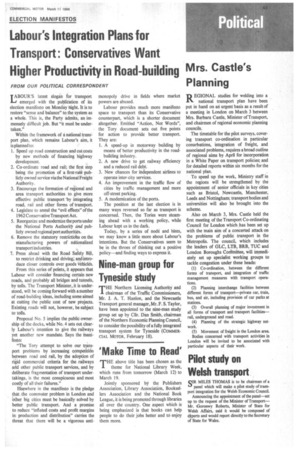L BOUR'S latest slogan for transport emerged with the publiCation of
Page 45

If you've noticed an error in this article please click here to report it so we can fix it.
its election manifesto on Monday night. It is to restore "sense and balance" to the system as a whole. This is, the Party admits; an immensely difficult job. But "it must be undertaken."
Within the framework of a national transport plan, which remains Labour's aim, it is planned to:
1. Speed up road construction and cut costs by new methods of financing highway development.
2. Co-ordinate road and rail; the first step being the promotion of a first-rate publicly owned service via the National Freight Authority.
3. Encourage the formation of regional and area transport authorities to give more effective public transport by integrating road, rail and other forms of transport.
4. Legislate to annul the "evil effects" of the 1962 Conservative Transport Mt.
5. Reorganize and modernize theports under the National Ports Authority and publicly owned regional port authorities.
6. Remove the statutory restriCticins on the• mItnufacturing powers of nationalized transport inch' stries.
7. Press ahead with the Road Safety Bill, to restrict drinking and driving; andintro duce closer controls over goods vehicles.
From this series of pdints, it appears that Labour will consider financing certain new roads, and probably all bridges and tunnels, by tolls. The Transport Minister, it is understood, will be coming forward with a number of road-building ideas, including some aimed at cutting the public cost of new projects. Existing roads will not, however, be subject to tolls.
Proposal No. 5 implies the public ownership of the docks, while No. 4 sets out clear ly Labour's intention to give the railways yet another new mandate. Says the Manifesto: "The Tory attempt to solve our transport problems by increasing competition between road and rail, by the adoption of rigid commercial criteria for the railways arid other public transport services, and by deliberate fragmentation of transport undertakings, is the most conspicuous and most costly of all their failures."
Elsewhere in the manifesto is the pledge that the commuter problem in London and Other big cities must be basically solved by better public transport. And a promise to reduce "inflated costs and profit margins in production and distribution" carries the threat that there will be a vigorous anti monopoly drive in fields where market powers are abused.
Labour provides much more manifesto space to transport than its Conservative counterpart, which is a shorter document altogether. Entitled "Action, Not Words", the Tory document sets out five points for action to provide better transport. They are: 1. A speed-up in motorway building by means of better productivity in the roadbuilding industry.
2. A new drive to get railway efficiency and a reduced rail debt.
3. New chances for independent airlines to operate inter-city services.
4. An improvement in the traffic flow of cities by traffic management and more off-street parking.
5. A modernization of the ports.
The position at the last election is in many ways reversed so far as transport is concerned. Then, the Tories were steaming ahead with a working policy, while Labour kept us in the dark.
Today, by a series of nods and hints, we may know a little more about Labour's intentions. But the Conservatives seem to be in the throes of thinking out a positive policy--and finding ways to express it.
Nine-man group for Tyneside study
'THE Northern Licensing Authority and
chairman of the Traffic Commissioners, Mr. J. A. T. Hanlon, and the Newcastle Transport general manager, Mr. F. S. Taylor, have been appointed to the nine-man study group set up by ClIr. Dan Smith, chairman of the Northern Economic Planning Council, to consider the possibility of a fully integrated transport system for Tyneside (COMMERCIAL MOTOR, February 18).








































































































































